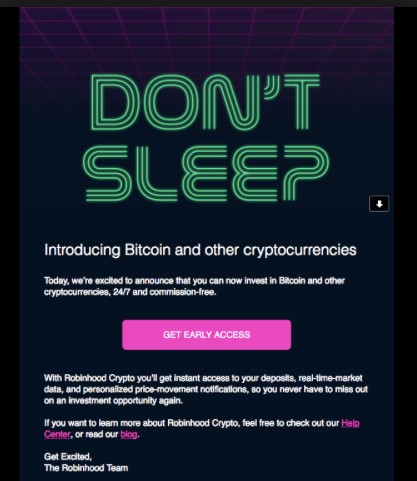Robinhood, the progressive app that democratized e-trading by making it absolutely free, is now valued at over $5 billion, gaining more than $4 billion in less than a year.
Robinhood gave trading back to the people, now it’s getting something back in return.
Set to raise $350 million in new venture funding, the Wall Street Journal puts Robinhood’s new valuation at $5.6 billion, up from $1.3 billion last April.
The funding round will be led by DST Global, the venture capital firm founded by Russian billionaire Yuri Milner.
And as it turns out, democratizing trading and making it free was simple: There’s no need for online brokerages to lavishly spend money on physical stores, tons of antiquated tech and loads of marketing. Robinhood accomplished this revolution in trading with just a handful of engineers.
Robinhood doesn’t have any stores. This is all mobile, all the time. There are no TV adds, and no phones: not even a customer service number.
Low overhead, means all trades are zero-fee, compared to around $7 per trade through E*Trade or Scottrade.
Now, at $5.6 billion, Robinhood is worth one-third of what E*Trade is worth.
Robinhood now has over 4 million users, and it just started rolling out cryptocurrency trading as well, though availability is still limited.
Not only has it made trading free, it’s also poised to change the face of American investing significantly because it’s biggest audience has been first-time investors. It’s a big win for capital markets considering that almost half of Americans don’t invest—many because they don’t know where to start, brokers are complicated, and fees add up too quickly.
Robinhood makes it exceedingly simple: Users register online, which takes about 30 seconds, attach a bank account to transfer funds, which takes a couple of minutes, and then … start trading. Beginners like the flexibility of moving in and out of stocks instantly, with no fee, as they try their hand at investing for the first time.
And the app also offers margin trading accounts and access to pre-market and after-hours for the more experienced, with Robinhood Gold, which costs users $6 per month.
Related: Amazon’s Bid For A Monopoly On Everything
For the Millennial generation, which has traditionally been more inclined to save than invest, it’s an app that finally speaks to them. All mobile, all simple, all instant—and free.
So how does Robinhood make money?
That’s simple, too: Robinhood Gold, and revenues from interest on cash and securities held in Robinhood accounts.
Co-founded by Vladimir Tenev and Baiju Bhatt, Robinhood is just getting started, and its recent foray into cryptocurrencies could even challenge major exchanges like Coinbase or Kraken.

(Click to enlarge)
In February, Robinhood opened up cryptocurrencies to its customers, listing 16 different digital coins and rolling them out state-by-state in a gradual process. But it’s got a long road ahead before it gives Coinbase and its 13 million users a run for their money.
Eventually, Robinhood plans to democratize even further, offering a full menu of financial services, and the $5.6-billion valuation shows that investors have enough confidence in their efforts to see it through.
By Jan Bauer for Safehaven.com
More Top Reads From Safehaven.com:
















